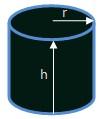Surface Area of a Cylinder
A cylinder can be defined as a solid figure that is bound by a curved surface and two flat surfaces. The surface area of a cylinder can be found by breaking it down into 2 parts:
1. The two circles that make up the caps of the cylinder.
2. The side of the cylinder, which when "unrolled" is a rectangle.
The area of each end cap can be found from the radius r of the circle, which is given by:
A = πr2
Thus the total area of the caps is 2πr2.
The area of a rectangle is given by:
A = height × width
The width is the height h of the cylinder, and the length is the distance around the end circles, or in other words the perimeter/circumference of the base/top circle and is given by:
P = 2πr
Thus the rectangle's area is rewritten as:
A = 2πr × h
Combining these parts together we will have the total surface area of a cylinder, and the final formula is given by:
A = 2πr2 + 2πrh
where:
π is Pi, approximately 3.142
r is the radius of the cylinder
h height of the cylinder

By factoring 2πr from each term we can simplify the formula to:
A = 2πr(r + h)
The lateral surface area of a cylinder is simply given by: LSA = 2πr × h.
Example 1: Find the surface area of a cylinder with a radius of 4 cm, and a height of 3 cm.
Solution:
SA = 2 × π × r2 + 2 × π × r × h
SA = 2 × 3.14 × 42 + 2 × 3.14 × 4 × 3
SA = 6.28 × 16 + 6.28 × 12
SA = 100.48 + 75.36
SA = 175.84
Surface area = 175.84 cm2
Example 2: Find the surface area of the cylinder with a radius of 5.5cm and height of 10cm.
Solution:
The radius of cylinder = 5.5 cm.
The height of cylinder = 10 cm.
The total surface area of the cylinder is therefore:
TSA = 2πr(r+h)
TSA = 11π (5.5+10)
TSA = 170.5 π
TSA = 535.6 cm2
Example 3: Find the total surface area of a cylindrical tin of radius 17 cm and height 3 cm.
Solution:
Again as in the previous example:
TSA = 2πr(r+h)
TSA = 2π× 17(17+3)
TSA = 2π×17×20
TSA = 2136.56 cm2
Example 4: Find the surface area of the cylinder with radius of 6 cm and height of 9 cm.
Solution:
The radius of cylinder: r = 6 cm
The height of cylinder: h = 9 cm
Total surface area of cylinder is therefore:
TSA = 2πr(r + h)
TSA = 12π (6+9)
TSA = 180 π
TSA = 565.56 cm2
Example 5: Find the radius of cylinder whose lateral surface area is 150 cm2 and its height is 9 cm.
Solution:
Lateral surface area of cylinder is given by:
LSA = 2πrh
Given that:
LSA = 150cm2
h = 9cm
π is the constant and its value = 3.14
Substitute the values in the formula and find the value of r by isolating it from the equation:
LSA = 2πrh
150 = 2× π × r × 9
r = 150 / (2×9× π)
r = 2.65cm
So the radius of the cylinder is 2.65 cm.
Online Surface Area Calculator